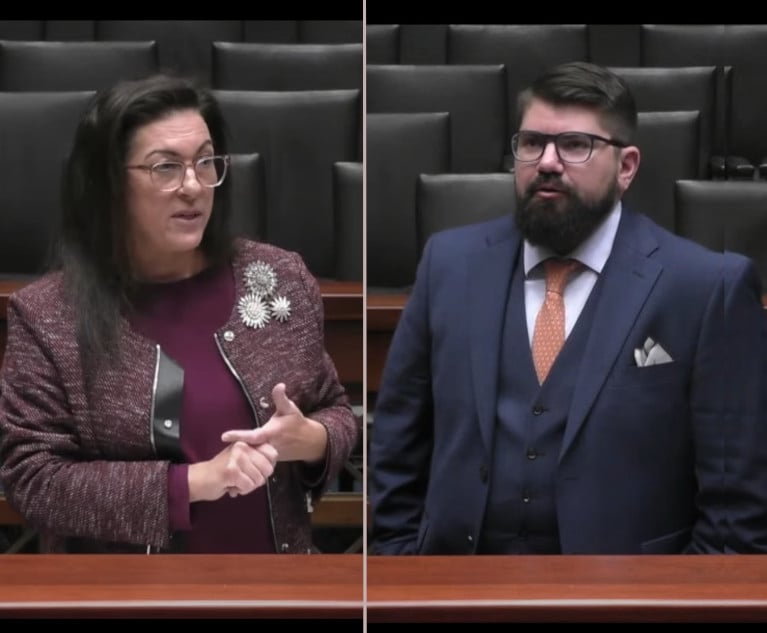 National Labor Relations Board headquarters in Washington, D.C.. Credit: Diego M. Radzinschi / ALM
National Labor Relations Board headquarters in Washington, D.C.. Credit: Diego M. Radzinschi / ALM NLRB Finds Non-Disparagement and Confidentiality Provisions in Severance Agreements Unlawful
Texas' strong public policy protecting the freedom of contract is firmly rooted in the state's jurisprudence. See Philadelphia Indemnity Insurance…
March 08, 2023 at 05:24 PM
7 minute read
Texas' strong public policy protecting the freedom of contract is firmly rooted in the state's jurisprudence. See Philadelphia Indemnity Insurance Co. v. White, 490 S.W.3d 468, 471 (Tex. 2016). Absent a compelling reason, courts must honor and enforce the terms of contracts that parties have voluntarily and freely entered. In recent years, the federal government has limited this freedom of contract in the employment context through statutes and agency activity.
In 2022, Congress passed the Ending Forced Arbitration of Sexual Assault and Sexual Harassment Act of 2021, which gives individuals asserting sexual harassment and sexual assault claims under federal or state law the right to opt out of a pre-dispute arbitration agreement and bring those claims in court. See 9 U.S.C. §§ 401, 402. Earlier this year, the Federal Trade Commission proposed a rule that would make it an unfair method of competition for an employer to maintain, enter into, or attempt to enter into a non-compete clause with certain workers. This proposed rule would supersede all inconsistent state laws and regulations. And, last month, in McLaren, a 3-1 majority of the National Labor Relations Board (NLRB or Board) overruled prior Board precedent and held that an employer violated the National Labor Relations Act (NLRA) by offering a severance agreement with non-disparagement and confidentiality provisions that would prohibit permanently furloughed employees from disclosing the terms of the severance agreement and making harmful or disparaging remarks about the employer. McLaren Macomb & Local 40 Rn Staff Council, Office & Prof'l Employees, Int'l Union (Opeiu), Afl-Cio, 372 NLRB No. 58 (Feb. 21, 2023). This article focuses on the recent NLRB decision.
This content has been archived. It is available through our partners, LexisNexis® and Bloomberg Law.
To view this content, please continue to their sites.
Not a Lexis Subscriber?
Subscribe Now
Not a Bloomberg Law Subscriber?
Subscribe Now
NOT FOR REPRINT
© 2025 ALM Global, LLC, All Rights Reserved. Request academic re-use from www.copyright.com. All other uses, submit a request to [email protected]. For more information visit Asset & Logo Licensing.
You Might Like
View All
Houston Appeals Court Split Over Race Discrimination Suit Involving COVID-19 Vaccine Distribution
4 minute read
Overtime Rewind: Texas Court Ruling Unravels FLSA Salary Level Increases
4 minute read
'It's Like They Lynched You:' Law Professor's Discrimination Claim Reaches High Court
7 minute readLaw Firms Mentioned
Trending Stories
- 1Relaxing Penalties on Discovery Noncompliance Allows Criminal Cases to Get Decided on Merit
- 2Reviewing Judge Merchan's Unconditional Discharge
- 3With New Civil Jury Selection Rule, Litigants Should Carefully Weigh Waiver Risks
- 4Young Lawyers Become Old(er) Lawyers
- 5Caught In the In Between: A Legal Roadmap for the Sandwich Generation
Who Got The Work
J. Brugh Lower of Gibbons has entered an appearance for industrial equipment supplier Devco Corporation in a pending trademark infringement lawsuit. The suit, accusing the defendant of selling knock-off Graco products, was filed Dec. 18 in New Jersey District Court by Rivkin Radler on behalf of Graco Inc. and Graco Minnesota. The case, assigned to U.S. District Judge Zahid N. Quraishi, is 3:24-cv-11294, Graco Inc. et al v. Devco Corporation.
Who Got The Work
Rebecca Maller-Stein and Kent A. Yalowitz of Arnold & Porter Kaye Scholer have entered their appearances for Hanaco Venture Capital and its executives, Lior Prosor and David Frankel, in a pending securities lawsuit. The action, filed on Dec. 24 in New York Southern District Court by Zell, Aron & Co. on behalf of Goldeneye Advisors, accuses the defendants of negligently and fraudulently managing the plaintiff's $1 million investment. The case, assigned to U.S. District Judge Vernon S. Broderick, is 1:24-cv-09918, Goldeneye Advisors, LLC v. Hanaco Venture Capital, Ltd. et al.
Who Got The Work
Attorneys from A&O Shearman has stepped in as defense counsel for Toronto-Dominion Bank and other defendants in a pending securities class action. The suit, filed Dec. 11 in New York Southern District Court by Bleichmar Fonti & Auld, accuses the defendants of concealing the bank's 'pervasive' deficiencies in regards to its compliance with the Bank Secrecy Act and the quality of its anti-money laundering controls. The case, assigned to U.S. District Judge Arun Subramanian, is 1:24-cv-09445, Gonzalez v. The Toronto-Dominion Bank et al.
Who Got The Work
Crown Castle International, a Pennsylvania company providing shared communications infrastructure, has turned to Luke D. Wolf of Gordon Rees Scully Mansukhani to fend off a pending breach-of-contract lawsuit. The court action, filed Nov. 25 in Michigan Eastern District Court by Hooper Hathaway PC on behalf of The Town Residences LLC, accuses Crown Castle of failing to transfer approximately $30,000 in utility payments from T-Mobile in breach of a roof-top lease and assignment agreement. The case, assigned to U.S. District Judge Susan K. Declercq, is 2:24-cv-13131, The Town Residences LLC v. T-Mobile US, Inc. et al.
Who Got The Work
Wilfred P. Coronato and Daniel M. Schwartz of McCarter & English have stepped in as defense counsel to Electrolux Home Products Inc. in a pending product liability lawsuit. The court action, filed Nov. 26 in New York Eastern District Court by Poulos Lopiccolo PC and Nagel Rice LLP on behalf of David Stern, alleges that the defendant's refrigerators’ drawers and shelving repeatedly break and fall apart within months after purchase. The case, assigned to U.S. District Judge Joan M. Azrack, is 2:24-cv-08204, Stern v. Electrolux Home Products, Inc.
Featured Firms
Law Offices of Gary Martin Hays & Associates, P.C.
(470) 294-1674
Law Offices of Mark E. Salomone
(857) 444-6468
Smith & Hassler
(713) 739-1250







